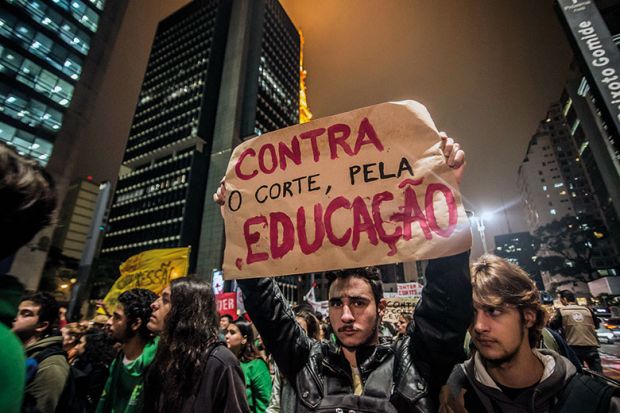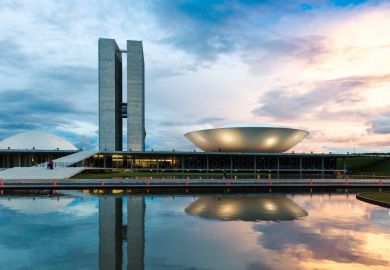On 1 August, Abilio Baeta Neves, president of council of the Brazilian federal postgraduate funding body Capes, took the exceptional step of publishing a letter warning that if the government followed through with its proposed cut to the education budget, Capes would have to suspend all of its 93,000 scholarships to students and researchers, as well as its 105,000 teacher training bursaries, for 2019.
The proposed cut is a further 11 per cent reduction to the budget that Capes receives from the government, on top of the swingeing cuts that federal funding has already suffered in the years since the 2014 financial crisis. The resulting outcry from the scientific community was swift, and remarkable in its intensity. Two days after Neves’ letter, the government announced that there would be no cuts to scholarships for 2019, and that it would implement a series of restructuring measures.
The cancellation of a scholarship programme is not ordinarily something that has the power to destabilise higher education systems, but the proposed cuts would have been different. The Capes scholarships are the principal source of funding for early career researchers and postgraduates, on whom Brazilian science is incredibly dependent. Suspending them would have led to the abandonment of dozens of research projects already in operation and fuelled more brain drain.
Halting these scholarships would also have cut the vital link between postgraduate research evaluation and funding, as well as leaving up to 20,000 Brazilians studying abroad without financial support. In the wake of last year’s abrupt cancellation of the Science Without Borders programme, this move would have further weakened Brazil’s international standing. Finally, the Capes scholarships serve as teacher training bursaries for teachers entering the public sector, which is one of the country’s most pressing long-term needs.
The cancellation of these scholarships with no reallocation of resources or replacement plan would have caused serious long-term structural damage to Brazilian science and research, healthcare, education and economy, as well as further harming its reputation as an international partner.
The condemnation of the proposed cut was near universal, ranging from student groups, to science associations and universities facing a sudden and severe deficit. A public statement from João Lima Sant’Anna Neto, provost of internationalisation at São Paulo State University (UNESP), said that this would mean a loss of R$110 million (£22.5 million) for his university from a total of R$295 million compared with 2017, as well as 56 per cent of all postgraduate scholarships.
The reaction was particularly notable for the fact that the senior management of Capes themselves, appointed by the government, were strident and public critics, putting their careers at risk to denounce the measure. Former minister of education Renato Janine Ribeiro pointed out: “These are not people from the opposition, they’re people inside Capes who see things as unsustainable…this time, it is the government itself that alerted the government. In other words, the situation is so grave that they have been forced to go public.”
Brazilian higher education and research has found itself under siege in recent years from a government that has prioritised short-term economic gains over long-term planning.
Despite this, the scientific community has shown itself to be remarkably durable in surviving severe funding cuts, bringing some public universities close to bankruptcy. It is testament to the determination, resilience and talent of Brazilian researchers that there has not been a precipitous decline in academic performance.
It is worth noting that, like the sudden cancellation of Science Without Borders, these cuts were the act of a government with no prospect of victory in the general election in October. As such, these moves should not be regarded as indicative of long-term governmental intention, but rather as the turbulent ending of what has been a particularly difficult governmental cycle.
In our public policy research for São Paulo state universities, we identified that one of the major barriers to sectoral progress and improvement has been the unpredictability of decisions taken by governments with regard to funding, which has made it extremely difficult for universities to plan for the future.
Having survived what we hope is the worst of the recession with its research infrastructure mostly intact, what Brazilian higher education needs in its next phase is a government with a long-term plan for the sector and a stable and reliable funding strategy.
Justin Axel-Berg is an associate researcher in higher education policy at the University of São Paulo.
POSTSCRIPT:
Print headline: Governmental unpredictability keeps Brazil’s universities from flourishing
Register to continue
Why register?
- Registration is free and only takes a moment
- Once registered, you can read 3 articles a month
- Sign up for our newsletter
Subscribe
Or subscribe for unlimited access to:
- Unlimited access to news, views, insights & reviews
- Digital editions
- Digital access to THE’s university and college rankings analysis
Already registered or a current subscriber?



